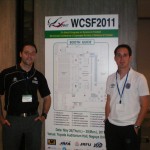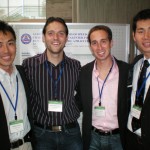RICHARD BUCCIARELLI, PRESIDENT OF SOCCER FITNESS INC., AND PAOLO PACIONE, HEAD STRENGTH AND CONDITIONING COACH FOR THE ONTARIO SOCCER ASSOCIATION, HAVE RETURNED FROM THE 7TH WORLD CONGRESS ON SCIENCE AND FOOTBALL IN NAGOYA, JAPAN, MAY 26-31, 2011.
THE CONGRESS IS AIMED AT ACADEMICS, SPORT SCIENTISTS, TEACHERS, STUDENTS, ADMINISTRATORS AND COACHES WITH AN INTEREST IN THE SCIENTIFIC STUDY AND/OR THE PRACTICAL PERFORMANCE OF SOCCER FROM THE GRASS ROOTS TO THE PROFESSIONAL LEVELS.
RICHARD AND PAOLO PRESENTED A STUDY, TITLED ‘LOGITUDINAL ANALYSIS OF SPEED CHARACTERISTICS IN ELITE LEVEL FEMALE SOCCER PLAYERS: A PILOT STUDY’, CONGRESS.

CONCLUSIONS OF THE STUDY INCLUDED:
- Canadian National Team players reached higher levels of consistently during the YO-YO Intermittent recovery Level 1 test throughout the years analyzed
- Canadian National Team players appear faster at earlier ages during short sprints, however, these trends do not improve over the years, whereas for Ontario Provincial team players, times for sprints tend to improve
- The ability to perform repeated high intensity sprint bouts appears to be enhanced between the different levels of play at earlier ages (U14-U15), but tends to equalize by the U16 age group
Read on for more some summaries of the invited symposia from the Congress, and be sure to check out our Member’s Area, for full versions of abstracts and detailed summaries of the presentations at the Congress
SUMMARY OF OTHER PRESENTERS AT THE CONGRESS:
Dr. Jens Bangsbo, Associate Professor, Exercise Physiology, University of Copenhagen, Copenhagen, Denmark:
- Contrary to previous theories, fatigue in soccer is not caused by high levels of lactic acid, low muscle creatine phosphate, or low muscle glycogen, but rather it is caused by an increase in intracellular potassium ions, which inhibit muscular contraction
- Proper aerobic endurance and speed endurance training in professional soccer players has been shown to increase the amount of sodium and potassium ion pumps, which allows the body to better regulate the concentration of potassium ions inside the muscle cells, thereby delaying the onset of fatigue
Dr. Aaron Coutts, Professor of Sport and Exercise Sicence, University of Sport and Tourism, Queensland, Australia:
- Soccer and Rugby athletes who performed high training loads in the 48 hours after competition show increased levels of both physiological fatigue, and perceived fatigue, and lost more games, as compared to athletes who performed low-moderate training loads
- A training load of less than 400 AU’s, at least 48 hours following competition, has been shown to have the highest toleration in soccer and rugby players
Dr. Svein Arne Pettersen, Professor, Exercise Physiologist, Norwegian Football Association:
- 1 hour of speed / short sprint competitions per week, in 11-12 year old male soccer players, was shown to yield significant improvements in both speed and agility (beyond normal improvements expected through growth and maturation)
- short sprint / speed competitions are more effective at provoking maximum effort in youth soccer players, as compared to general sprint and running training
Dr Mads Bendiksen, Professor of Exercise Science, University of Copenhagen, Copenhagen, Denmark
- A modified version of the Yo-Yo Intermittent Recovery Test, Level 1, has been shown to be an accurate and reliable predictor of high intensity running capacity in soccer players aged 7-10 year old soccer players
- The modified version of the Yo-Yo IR 1 test uses the same time / beep intervals, for both the shuttle runs and the 10-second rest period, however the shuttle runs are performed using 2 x 16 metres, as opposed to 2 x 20 metres



